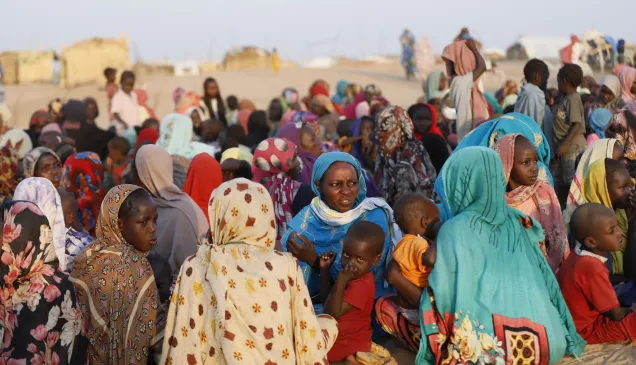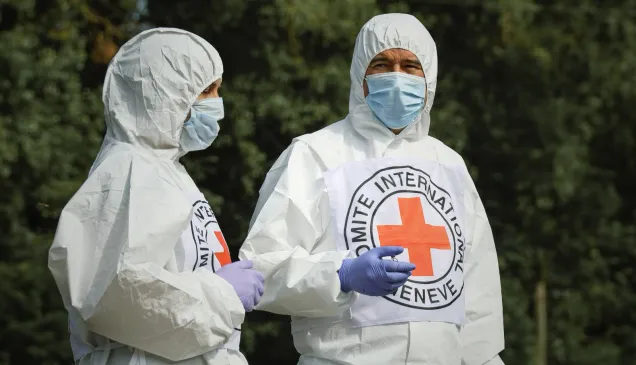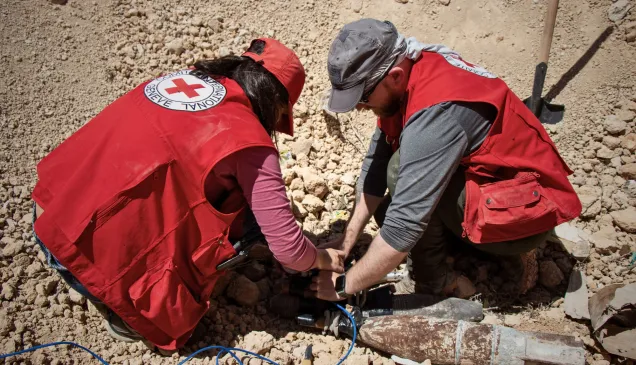Sexual violence in conflict: Putting the individual first

The importance of survivor-centred approaches when responding to sexual violence in conflict.
Last week the ICRC co-hosted an online event with the All Party Parliamentary Group (APPG) on the Preventing Sexual Violence in Conflict Initiative (PSVI) and the British Red Cross, to discuss survivor-centred approaches to responding to sexual and gender-based violence in conflict and emergencies.
We were joined by the Prime Minister's Special Representative on Preventing Sexual Violence in Conflict, Lord Ahmad, as well as MPs, peers, NGO representatives and survivor advocates, who were generous in sharing their own experiences and explaining some of the challenges they faced.
The event was introduced by APPG Chair Anthony Mangnall MP, Vice-Chair Fleur Anderson MP and Lord Ahmad, who said very clearly that "survivors must be at the heart of informing and formulating policy."
This was a sentiment echoed by Hilary Douglas of the British Red Cross: "We strongly believe that decisions around health care, socio-economic support and justice must be based on the wishes and needs identified by survivors themselves - in order to prevent further harm.
"However, despite growing recognition within policy formulation, and significant access to guidance and resources, survivor-centred approaches are yet to be fully translated into meaningful practice by states, especially in relation to health and justice systems."
Give survivors a voice
We were first joined by Kolbassia Haoussou MBE, the head of the UK's only torture survivor-led network Survivors Speak OUT, which he co-founded in 2007. Kolbassia emphasised the importance of a holistic survivor-centred approach when responding to a situation of sexual or gender-based violence.
"The first thing that should be in place is commitment," he said, "The commitment to listen to survivors and act on their recommendations."
"Secondly to create a safe space, a protective space, where survivors feel safe to engage, and that their engagement will not harm them.
"The third thing in survivor-centred approach is creating a space where we can empower survivors in their participation. And at the same time disempower perpetrators and put the stigma back to where it belongs.
Give survivors a choice. Give survivors a voice. Give them the power and resources to organise themselves and make their own decisions.
What does justice look like?
Nadine Tunasi is a human rights activist who leads the policy and research group of the Survivors Speak OUT network. Both Nadine and Kolbassia work alongside Lord Ahmad in their ongoing roles as Survivor Champions for PSVI. They work to ensure survivors are at the centre of decision-making and policy development.
Nadine talked about the concept of justice and how this can be applied to survivors of SGBV.
"Justice is a big word for survivors," Nadine noted.
"It is a very big and ambitious word. And it's often – I feel from my own experience - and from talking to other survivors - misinterpreted and misunderstood.
"Effective justice is the justice that is right for them. Survivors need to be seen as an individual with specific needs."
At what cost?
This theme of what is meant by justice was picked up by our next speaker, Esperande Bigirimana. Esperande was born in Burundi and is a survivor advocate and women's rights activist. She explained the barriers that survivors face when seeking formal justice and reflected on what governments and organisations can do to support them.
Esperande reminded us that for many survivors, speaking out has a terrible cost.
She said: "Many survivors have been threatened and killed or kidnapped just because they spoke out about what they experienced.
"We can say that we have progressive legislation. But in practice, this legislation does not provide protection when survivors seek justice.
We need to be survivor driven at a community level, at a national level and at an international level.
Anthony Mangnall MP agreed this is a global problem, to which we need a global solution.
Men are less likely to seek help
Whilst women and girls are disproportionately affected, conflict-related sexual violence also affects men and boys. Anthony Keedi is the Masculinities Technical Advisor, at ABAAD Resource Centre for Gender Equality and has been working in Lebanon for the past 13 years piloting and promoting the concept of engaging men in ending violence against women and masculinities.
Anthony explained some of the barriers to men and boys seeking support.
He said: "Men are less likely to seek help, as seeking help is inherently seen as feminine or emasculating. But specifically when the thing they are seeking help for is emasculating, such as being a survivor of sexual violence.
"And this is when we can start talking about sexual violence being used as a weapon of war. Sexual violence against men will be trying to disempower or devalue those who should be, by patriarchal expectations, the protectors, and providers and source of strength.
"And if you can take that away from them than you can take away their value.
"This is the same when it is women, girls and boys being the victims of SGBV and men are made to watch. It's important to understand how those patriarchal notions of masculinity and femininity are the root causes of SGBV. For women and men."
Anthony was asked about the role stigma plays in preventing survivors from accessing health care, justice and other essential services.
"It's classic misdirection," he said, "Because when we're busy asking questions of the survivor, and why this has happened to her and how this might have played a part, no one is asking questions about the perpetrator."
What role can NGOs play in supporting survivors to seek justice and access vital services?
Harriet Kezaabu works for the International Rescue Committee as the women protection & empowerment coordinator in Kampala, Uganda.
"At the IRC we work according to the guiding principles that promote confidentiality, non-discrimination, and respect, to ensure dignity of women and girls is upheld at all times.
"This means that when we work with survivors we must ensure that their experience, rights and decisions are respected at all times. This includes ensuring that survivors' data privacy is maintained at all times."
May Maloney is ICRC's addressing sexual violence advisor based in Geneva. She talked attendees through one of the things we and other organisations are seeing on the ground which is having unintended consequences: mandatory reporting.
What is mandatory reporting?
Earlier this year we published a joint report with @BritishRedCross on the humanitarian impact of mandatory reporting.
We asked our Policy Advisor @SarahTCotton to explain what it's all aboutpic.twitter.com/135wKg68Oo— ICRC UK & Ireland (@ICRC_uk) October 23, 2020
"It was great to have so many speakers present," said Rachael Cox, ICRC UK & Ireland policy advisor, "It gave us an opportunity to demonstrate the importance of putting the survivor front and centre of any policies designed to support them, while making us more aware of the challenges and barriers they face to justice.
"Mandatory reporting is an example of a system put in place often with good intentions - to tackle impunity – but which is having a detrimental effect on victims/survivors, limiting access to health care and exposing them to secondary violence and harm.
"As Nadine said, 'survivors need to be seen as an individual with specific needs. Effective justice is the justice that is right for them.'"



